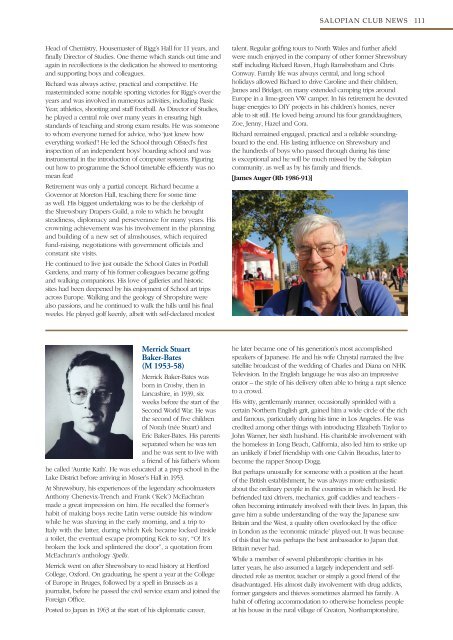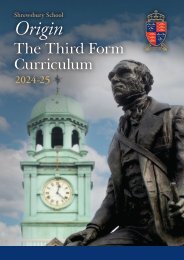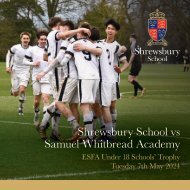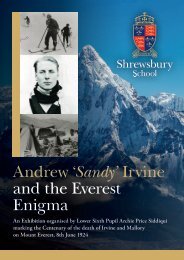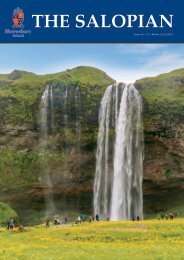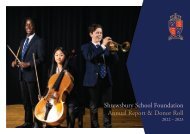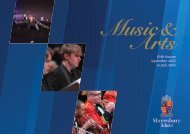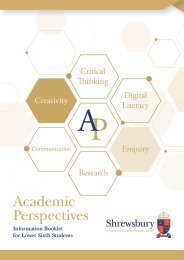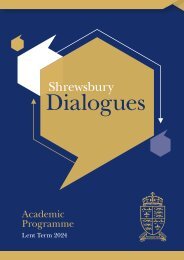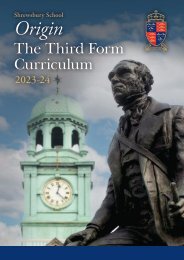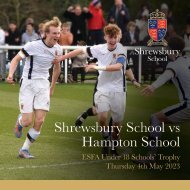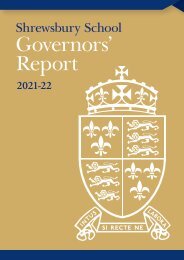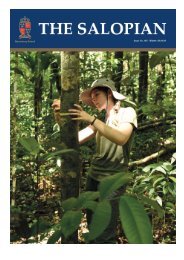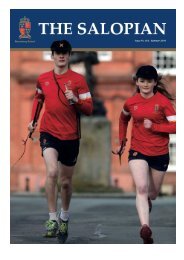The Salopian Summer 2023
v2
v2
You also want an ePaper? Increase the reach of your titles
YUMPU automatically turns print PDFs into web optimized ePapers that Google loves.
SALOPIAN CLUB NEWS 111<br />
Head of Chemistry, Housemaster of Rigg’s Hall for 11 years, and<br />
finally Director of Studies. One theme which stands out time and<br />
again in recollections is the dedication he showed to mentoring<br />
and supporting boys and colleagues.<br />
Richard was always active, practical and competitive. He<br />
masterminded some notable sporting victories for Rigg’s over the<br />
years and was involved in numerous activities, including Basic<br />
Year, athletics, shooting and staff football. As Director of Studies,<br />
he played a central role over many years in ensuring high<br />
standards of teaching and strong exam results. He was someone<br />
to whom everyone turned for advice, who ‘just knew how<br />
everything worked’! He led the School through Ofsted’s first<br />
inspection of an independent boys’ boarding school and was<br />
instrumental in the introduction of computer systems. Figuring<br />
out how to programme the School timetable efficiently was no<br />
mean feat!<br />
Retirement was only a partial concept. Richard became a<br />
Governor at Moreton Hall, teaching there for some time<br />
as well. His biggest undertaking was to be the clerkship of<br />
the Shrewsbury Drapers Guild, a role to which he brought<br />
steadiness, diplomacy and perseverance for many years. His<br />
crowning achievement was his involvement in the planning<br />
and building of a new set of almshouses, which required<br />
fund-raising, negotiations with government officials and<br />
constant site visits.<br />
He continued to live just outside the School Gates in Porthill<br />
Gardens, and many of his former colleagues became golfing<br />
and walking companions. His love of galleries and historic<br />
sites had been deepened by his enjoyment of School art trips<br />
across Europe. Walking and the geology of Shropshire were<br />
also passions, and he continued to walk the hills until his final<br />
weeks. He played golf keenly, albeit with self-declared modest<br />
talent. Regular golfing tours to North Wales and further afield<br />
were much enjoyed in the company of other former Shrewsbury<br />
staff including Richard Raven, Hugh Ramsbotham and Chris<br />
Conway. Family life was always central, and long school<br />
holidays allowed Richard to drive Caroline and their children,<br />
James and Bridget, on many extended camping trips around<br />
Europe in a lime-green VW camper. In his retirement he devoted<br />
huge energies to DIY projects in his children’s homes, never<br />
able to sit still. He loved being around his four granddaughters,<br />
Zoe, Jenny, Hazel and Cora.<br />
Richard remained engaged, practical and a reliable soundingboard<br />
to the end. His lasting influence on Shrewsbury and<br />
the hundreds of boys who passed through during his time<br />
is exceptional and he will be much missed by the <strong>Salopian</strong><br />
community. as well as by his family and friends.<br />
[James Auger (Rb 1986-91)]<br />
Merrick Stuart<br />
Baker-Bates<br />
(M 1953-58)<br />
Merrick Baker-Bates was<br />
born in Crosby, then in<br />
Lancashire, in 1939, six<br />
weeks before the start of the<br />
Second World War. He was<br />
the second of five children<br />
of Norah (née Stuart) and<br />
Eric Baker-Bates. His parents<br />
separated when he was ten<br />
and he was sent to live with<br />
a friend of his father’s whom<br />
he called ‘Auntie Kath’. He was educated at a prep school in the<br />
Lake District before arriving in Moser’s Hall in 1953.<br />
At Shrewsbury, his experiences of the legendary schoolmasters<br />
Anthony Chenevix-Trench and Frank (‘Kek’) McEachran<br />
made a great impression on him. He recalled the former’s<br />
habit of making boys recite Latin verse outside his window<br />
while he was shaving in the early morning, and a trip to<br />
Italy with the latter, during which Kek became locked inside<br />
a toilet, the eventual escape prompting Kek to say, “O! It’s<br />
broken the lock and splintered the door”, a quotation from<br />
McEachran’s anthology Spells.<br />
Merrick went on after Shrewsbury to read history at Hertford<br />
College, Oxford. On graduating, he spent a year at the College<br />
of Europe in Bruges, followed by a spell in Brussels as a<br />
journalist, before he passed the civil service exam and joined the<br />
Foreign Office.<br />
Posted to Japan in 1963 at the start of his diplomatic career,<br />
he later became one of his generation’s most accomplished<br />
speakers of Japanese. He and his wife Chrystal narrated the live<br />
satellite broadcast of the wedding of Charles and Diana on NHK<br />
Television. In the English language he was also an impressive<br />
orator – the style of his delivery often able to bring a rapt silence<br />
to a crowd.<br />
His witty, gentlemanly manner, occasionally sprinkled with a<br />
certain Northern English grit, gained him a wide circle of the rich<br />
and famous, particularly during his time in Los Angeles. He was<br />
credited among other things with introducing Elizabeth Taylor to<br />
John Warner, her sixth husband. His charitable involvement with<br />
the homeless in Long Beach, California, also led him to strike up<br />
an unlikely if brief friendship with one Calvin Broadus, later to<br />
become the rapper Snoop Dogg.<br />
But perhaps unusually for someone with a position at the heart<br />
of the British establishment, he was always more enthusiastic<br />
about the ordinary people in the countries in which he lived. He<br />
befriended taxi drivers, mechanics, golf caddies and teachers -<br />
often becoming intimately involved with their lives. In Japan, this<br />
gave him a subtle understanding of the way the Japanese saw<br />
Britain and the West, a quality often overlooked by the office<br />
in London as the ‘economic miracle’ played out. It was because<br />
of this that he was perhaps the best ambassador to Japan that<br />
Britain never had.<br />
While a member of several philanthropic charities in his<br />
latter years, he also assumed a largely independent and selfdirected<br />
role as mentor, teacher or simply a good friend of the<br />
disadvantaged. His almost daily involvement with drug addicts,<br />
former gangsters and thieves sometimes alarmed his family. A<br />
habit of offering accommodation to otherwise homeless people<br />
at his house in the rural village of Creaton, Northamptonshire,


